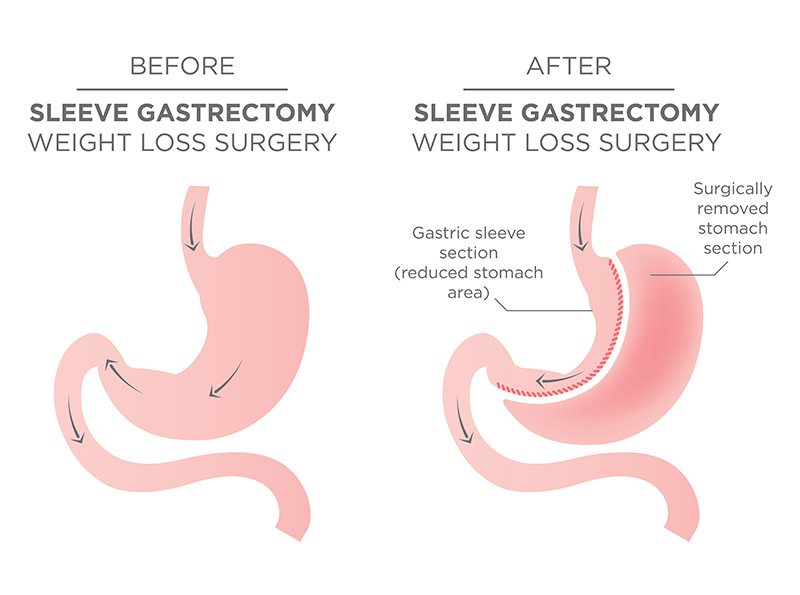
About
Laparoscopic sleeve gastrectomy is a less invasive option for weight loss surgery. Patients typically see fast weight loss results and overall health improvements.
How Does Laparoscopic Sleeve Gastrectomy Work?
During laparoscopic surgery, a surgeon will make small incisions in the abdomen and insert small instruments and a camera to perform the procedure. During a sleeve gastrectomy, two-thirds of the stomach is removed, leaving the remaining stomach the size and shape of a small banana. This limits the amount of food you can consume at each meal.
Laparoscopic sleeve gastrectomy does not require rerouting or reconnecting of the intestines.

Advantages of Laparoscopic Sleeve Gastrectomy
Advantages of laparoscopic sleeve gastrectomy include:
- Rapid initial weight loss
- Minimally invasive, laparoscopic approach, resulting in less scarring and shorter recovery time after surgery
- Higher total average weight loss reported than adjustable gastric banding.
Disadvantages of Laparoscopic Sleeve Gastrectomy
Potential disadvantages of laparoscopic sleeve gastrectomy are:
- Side effects of stomach cutting and stapling
- Higher operative risk than adjustable gastric banding
- Small risk of nutritional deficiencies
- Non-adjustable and not reversible
Improvements in Health
Many obesity related conditions improve or even disappear within one to two years after laparoscopic sleeve gastrectomy including:
- High blood pressure (hypertension)
- High cholesterol
- Diabetes
- Sleep apnea
Recovery After Laparoscopic Sleeve Gastrectomy
After laparoscopic sleeve gastrectomy, you can expect to stay in the hospital for two nights. You should be able to resume your normal daily activities in two to four weeks.
Weight Loss Results After Laparoscopic Sleeve Gastrectomy
Most people who have gastric sleeve surgery lose 60 to 65 percent of their excess body weight during the first year after surgery.
Will Laparoscopic Sleeve Gastrectomy Surgery Work for Me?
Our most successful patients are those who follow our weight loss surgery program, keep their postoperative appointments and attend our monthly support group meetings.
Regular follow-up care is crucial to weight loss success after surgery. After recovery, you will need to exercise regularly and modify your diet. Your care team will discuss what you need to do to stay healthy.












